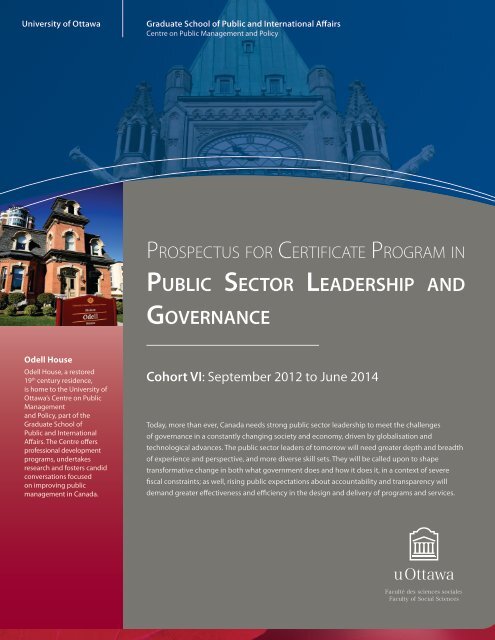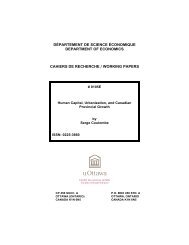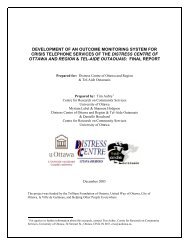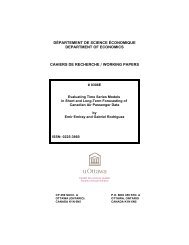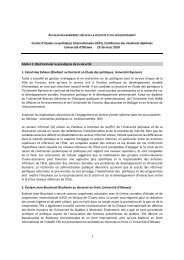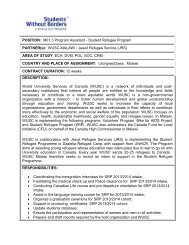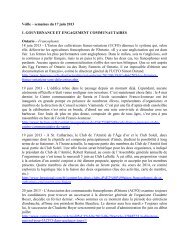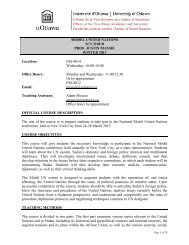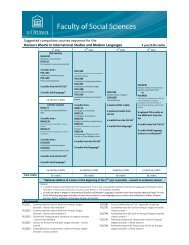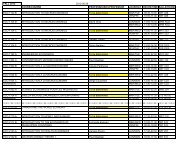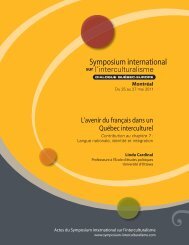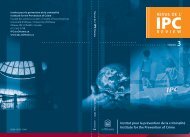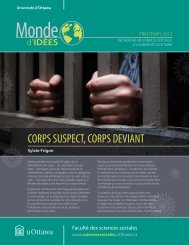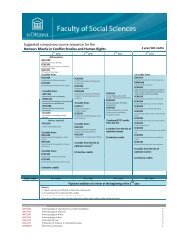public sector leadership and governance - Faculty of Social Sciences
public sector leadership and governance - Faculty of Social Sciences
public sector leadership and governance - Faculty of Social Sciences
Create successful ePaper yourself
Turn your PDF publications into a flip-book with our unique Google optimized e-Paper software.
University <strong>of</strong> Ottawa<br />
Graduate School <strong>of</strong> Public <strong>and</strong> International Affairs<br />
Centre on Public Management <strong>and</strong> Policy<br />
Prospectus for Certificate Program in<br />
Public Sector Leadership <strong>and</strong><br />
Governance<br />
Odell House<br />
Odell House, a restored<br />
19 th century residence,<br />
is home to the University <strong>of</strong><br />
Ottawa’s Centre on Public<br />
Management<br />
<strong>and</strong> Policy, part <strong>of</strong> the<br />
Graduate School <strong>of</strong><br />
Public <strong>and</strong> International<br />
Affairs. The Centre <strong>of</strong>fers<br />
pr<strong>of</strong>essional development<br />
programs, undertakes<br />
research <strong>and</strong> fosters c<strong>and</strong>id<br />
conversations focused<br />
on improving <strong>public</strong><br />
management in Canada.<br />
Cohort VI: September 2012 to June 2014<br />
Today, more than ever, Canada needs strong <strong>public</strong> <strong>sector</strong> <strong>leadership</strong> to meet the challenges<br />
<strong>of</strong> <strong>governance</strong> in a constantly changing society <strong>and</strong> economy, driven by globalisation <strong>and</strong><br />
technological advances. The <strong>public</strong> <strong>sector</strong> leaders <strong>of</strong> tomorrow will need greater depth <strong>and</strong> breadth<br />
<strong>of</strong> experience <strong>and</strong> perspective, <strong>and</strong> more diverse skill sets. They will be called upon to shape<br />
transformative change in both what government does <strong>and</strong> how it does it, in a context <strong>of</strong> severe<br />
fiscal constraints; as well, rising <strong>public</strong> expectations about accountability <strong>and</strong> transparency will<br />
dem<strong>and</strong> greater effectiveness <strong>and</strong> efficiency in the design <strong>and</strong> delivery <strong>of</strong> programs <strong>and</strong> services.
In September 2012, up to 24 participants will begin a 20-month journey <strong>of</strong> learning <strong>and</strong><br />
discovery at the University <strong>of</strong> Ottawa’s Odell House, home <strong>of</strong> the Centre on Public Management<br />
<strong>and</strong> Policy. By the time they receive their Certificate in Public Sector Leadership <strong>and</strong> Governance<br />
in June 2014, participants will have:<br />
• gained a broad underst<strong>and</strong>ing <strong>of</strong> fundamental<br />
principles, sound practices <strong>and</strong> current issues <strong>and</strong><br />
challenges in <strong>public</strong> management <strong>and</strong> policy<br />
• met with a wide cross-section <strong>of</strong> top practitioners<br />
<strong>and</strong> thought leaders from the federal <strong>public</strong> service<br />
<strong>and</strong> other <strong>public</strong> <strong>sector</strong> organizations, as well as the<br />
worlds <strong>of</strong> politics, business, civil society, <strong>and</strong> the<br />
universities, for c<strong>and</strong>id dialogue on their experience<br />
<strong>and</strong> lessons learned;<br />
• compared perspectives with counterparts <strong>and</strong><br />
experts across Canada <strong>and</strong> abroad through three<br />
one-week study tours;<br />
• probed <strong>and</strong> deepened their mastery <strong>of</strong> the personal<br />
<strong>and</strong> interpersonal dimensions <strong>of</strong> high-level<br />
<strong>leadership</strong>; <strong>and</strong><br />
• forged life-long bonds <strong>of</strong> trust <strong>and</strong> friendship with<br />
first-rate colleagues.<br />
The Certificate Program is targeted to exceptional middlelevel<br />
executives. While participants are primarily from the federal<br />
<strong>public</strong> service, executives from Crown corporations, provincial or<br />
municipal <strong>public</strong> services, or the private <strong>sector</strong> will also benefit<br />
from the Program, <strong>and</strong> will enrich its value for all participants.<br />
The Certificate Program is organized into three modules:<br />
<strong>public</strong> <strong>sector</strong> management; <strong>governance</strong>; <strong>and</strong> Canada in the world.<br />
Each module includes a particular emphasis on assessing evidence<br />
in shaping advice <strong>and</strong> action.<br />
We begin with a late August Orientation Session to help<br />
participants transition into the program, learn about expectations<br />
<strong>and</strong> begin to form relationships with colleagues. A four-day<br />
October boot camp follows, divided into two 2-day sessions on<br />
basic concepts <strong>and</strong> principles <strong>of</strong> Canadian <strong>public</strong> management<br />
<strong>and</strong> <strong>governance</strong>. This will ensure that everyone shares a common<br />
base <strong>of</strong> knowledge on which to build more sophisticated concepts<br />
<strong>and</strong> debates. This introductory session will also include exercises to<br />
clarify each participant’s <strong>leadership</strong> practice as a basis for setting<br />
individual development goals.<br />
The Program concerns itself throughout with the<br />
key areas <strong>of</strong> executive competencies identified<br />
by the federal Treasury Board Secretariat <strong>and</strong><br />
the Public Service Commission <strong>of</strong> Canada :<br />
values <strong>and</strong> ethics, strategic thinking, engagement,<br />
<strong>and</strong> management excellence. The aim is to assist<br />
participants to prepare themselves to assume greater<br />
responsibility at the levels <strong>of</strong> Assistant Deputy<br />
Minister or Director General, or their equivalents.
The time commitment for participants is about three<br />
days per month over the Program’s 20 months, as<br />
follows:<br />
• Four sessions (normally one <strong>and</strong> one-half days each in<br />
duration) for each <strong>of</strong> the three five-month modules at Odell<br />
House plus five sessions during the boot camp <strong>and</strong> wrap-up<br />
stages. This totals at least 25 days.<br />
• A one-week study tour, either in Canada or abroad, during<br />
each module.<br />
• Other events (such as action learning sessions) not exceeding<br />
10 days in total.<br />
• About one additional day per month for reading <strong>and</strong><br />
assignments.<br />
We request that nominations be<br />
submitted by July 30, 2012 so that the<br />
participants <strong>and</strong> Program staff have<br />
the opportunity to meet during the<br />
summer <strong>and</strong> prepare for the Program<br />
launch in the autumn.<br />
The Program modules are <strong>of</strong>fered bilingually in English <strong>and</strong> French,<br />
with participants <strong>and</strong> presenters alike speaking or writing in the <strong>of</strong>ficial<br />
language <strong>of</strong> their choice.<br />
The two-year cost for the Program is $32,000, payable in two installments <strong>of</strong><br />
$16,000 by April 2013 <strong>and</strong> April 2014. Travel costs are paid by the sponsoring<br />
organization. The three study tours are likely to cost between $7,000 <strong>and</strong><br />
$10,000 in total.<br />
To facilitate the participation <strong>of</strong> qualified c<strong>and</strong>idates residing outside the<br />
National Capital Region (NCR), the Program will reimburse normal travel costs<br />
<strong>of</strong> up to $10,000 for attendance at the regular sessions in Ottawa.<br />
Participants from the federal <strong>public</strong> service are normally recommended by<br />
their relevant Deputy Minister or Assistant Deputy Minister from among their<br />
most promising EX 3 <strong>and</strong> EX 2 leaders. Participants from provincial/territorial<br />
administrations or the private or non-pr<strong>of</strong>it <strong>sector</strong>s are usually recommended<br />
by the equivalent appropriate senior <strong>of</strong>ficial in their organization.<br />
APPLICATIONS SHOULD BE SENT TO:<br />
James Lahey<br />
Director, Centre on Public Management<br />
<strong>and</strong> Policy<br />
University <strong>of</strong> Ottawa<br />
Odell House, 180 Waller Street<br />
Ottawa, Ontario K1N 9B9<br />
Tel: 613 562-5800, Ext. 3755<br />
E-mail: james.lahey@uOttawa.ca<br />
QUESTIONS MAY ALSO BE DIRECTED TO<br />
613-562-5800 FOR:<br />
• Anna Jahn Ext. 3889<br />
• John McKennirey Ext. 3876<br />
• Reilly Kaunisviita Ext. 3879
Meeting the Need for<br />
Public Sector Executive Development<br />
Public Management in the Modern State<br />
Canada, as every advanced nation, depends importantly on<br />
government policies, programs <strong>and</strong> services for the effective<br />
functioning <strong>of</strong> its economy <strong>and</strong> society. While there are always<br />
differences <strong>of</strong> view <strong>and</strong> shifting policies regarding the nature <strong>and</strong><br />
extent <strong>of</strong> government activities, these differences play out within<br />
a broad scope <strong>of</strong> responsibilities<br />
Few senior managers which is common to all advanced<br />
nations: from national defence<br />
will take up their roles <strong>and</strong> security to education <strong>and</strong> the<br />
with all the requisite social safety nets; from financial<br />
<strong>and</strong> economic regulation to<br />
knowledge <strong>and</strong> skills. administration <strong>of</strong> justice.<br />
To deliver on these essential functions, governments in<br />
the modern state face very significant organizational <strong>and</strong><br />
management challenges. Meeting these challenges falls to the<br />
senior ranks <strong>of</strong> the <strong>public</strong> service; <strong>and</strong> their ability to do so has a<br />
critical impact on a nation’s overall performance.<br />
Management Cadre Challenges Today<br />
The Canadian government (like most western governments) is<br />
facing difficult fiscal constraints due to the global financial crisis<br />
which must be met by substantial spending reductions <strong>and</strong><br />
controls on programs <strong>and</strong> administration. This is coupled with<br />
the policy challenge to promote economic growth in a context <strong>of</strong><br />
global <strong>and</strong> domestic deficit <strong>and</strong> debt reduction.<br />
The coming generation <strong>of</strong> federal government executives must<br />
meet these challenges while they master the dem<strong>and</strong>s <strong>of</strong> new jobs<br />
at higher levels. As experienced senior managers retire in large<br />
numbers, there is a need for many managers to assume senior<br />
positions today without the benefit <strong>of</strong> a wide experience which<br />
would have been more common for the previous generation.<br />
The demographic question is only part <strong>of</strong> even wider challenges<br />
faced by <strong>public</strong> <strong>sector</strong> executives today. Rapid <strong>and</strong> far reaching<br />
changes in the structure <strong>of</strong> the national <strong>and</strong> global economies,<br />
in technology <strong>and</strong> business practices, in demography <strong>and</strong><br />
immigration, <strong>and</strong> in shifting global politics <strong>and</strong> centres <strong>of</strong><br />
power, must be met by changes in what governments do <strong>and</strong><br />
how they operate.<br />
As managers move to senior executive positions, they must<br />
deal with a much broader range <strong>of</strong> realities, <strong>of</strong>ten beyond their<br />
previous experience: relations with the political level <strong>and</strong> with<br />
Parliament, national fiscal <strong>and</strong> financial affairs, the functioning<br />
<strong>of</strong> Cabinet, the legislative process, international relations, large<br />
scale IT systems, <strong>and</strong> people management involving hundreds<br />
<strong>and</strong> thous<strong>and</strong>s rather than small teams. They must also<br />
underst<strong>and</strong> the interrelationships between their organization<br />
<strong>and</strong> the government as a whole, involving many other<br />
departments <strong>and</strong> agencies with different areas <strong>of</strong><br />
specialization, other levels <strong>of</strong> government, <strong>and</strong> other<br />
countries <strong>and</strong> international organizations, as well as<br />
the private <strong>sector</strong>.<br />
Few senior managers will take up their roles with all<br />
the requisite knowledge <strong>and</strong> skills. Most will need to<br />
fill in more than one gap in their formation. All will<br />
need to learn how to think <strong>and</strong> operate on a horizontal<br />
plane, looking at the immediate <strong>and</strong> the long term<br />
simultaneously, <strong>and</strong> making “strategic” more than a<br />
buzz word. Executives must continue to learn <strong>and</strong><br />
grow even more intensively in senior positions than<br />
they did on the way up.
Background to the Certificate Program<br />
In January 2007, the University <strong>of</strong> Ottawa launched its Certificate<br />
Program in Public Sector Leadership <strong>and</strong> Governance. The Program<br />
was designed specifically to address these challenges. Since then,<br />
more than 100 participants in five cohorts have<br />
undertaken the Program. Further cohorts will be<br />
“<br />
launched each autumn.<br />
Program Objectives<br />
The Program has ambitious objectives, not<br />
only in terms <strong>of</strong> imparting new knowledge,<br />
but in developing new skills, providing new<br />
tools, <strong>and</strong>, ultimately, promoting a process <strong>of</strong><br />
personal growth aimed at realizing the <strong>leadership</strong><br />
potential <strong>of</strong> each participant. The Program aims<br />
to accelerate the development <strong>of</strong> promising<br />
practitioners in preparation for assuming greater<br />
responsibilities in the coming years.<br />
Specifically, our goals are:<br />
• To deepen participants’ underst<strong>and</strong>ing <strong>of</strong> leading thought <strong>and</strong><br />
practice in the areas <strong>of</strong> <strong>public</strong> <strong>sector</strong> management, <strong>governance</strong>,<br />
<strong>and</strong> Canada in the world, paying attention throughout to the<br />
sound use <strong>of</strong> evidence in determining advice <strong>and</strong> action;<br />
• To broaden participants’ exposure to diverse ways <strong>of</strong> thinking<br />
<strong>and</strong> acting as leaders in the increasingly accountable, networked<br />
<strong>and</strong> global environment in which they must operate;<br />
<strong>and</strong> Policy itself is housed in historic Odell House ideally suited<br />
for informal discussion (under the “Chatham House rule”<br />
intended to encourage direct <strong>and</strong> frank conversation <strong>and</strong> ensure<br />
confidentiality). Participants work in groups <strong>of</strong> up to 24 who stay<br />
together for the 20 month duration <strong>of</strong> the Program.<br />
Whether a seasoned or newly-minted executive, this Program delivers on its<br />
promise. One <strong>of</strong> its many attractive features is learning from experts <strong>and</strong> senior<br />
leaders, both past <strong>and</strong> present. Equally beneficial is the building <strong>of</strong> relationships<br />
”<br />
Veronica McGuire, Executive Director<br />
Canadian Food Inspection Agency (CFIA)<br />
participant in cohort IV<br />
<strong>and</strong> the sharing <strong>of</strong> insights with peers from across the <strong>public</strong> service.<br />
The Program uses a variety <strong>of</strong> approaches <strong>and</strong> methods:<br />
• personal contact <strong>and</strong> dialogue with outst<strong>and</strong>ing leaders in<br />
government, politics, the media, the private <strong>sector</strong> <strong>and</strong> academe<br />
(see Annex A for examples from the past three years);<br />
• exercises that challenge the participants to learn <strong>and</strong> practice new<br />
skills <strong>and</strong> knowledge on their own;<br />
• debate <strong>and</strong> dialogue within the group as participants learn to learn<br />
from each other;<br />
• To develop participants’ <strong>leadership</strong> practice, including their<br />
capacity for self-directed <strong>and</strong> group learning, problem-solving,<br />
<strong>and</strong> personal resilience; <strong>and</strong><br />
• To connect participants across all the Cohorts, <strong>and</strong> with thought<br />
leaders in the University <strong>and</strong> the wider world.<br />
Program Design<br />
A. Approaches <strong>and</strong> Methods<br />
We take experienced senior mangers out <strong>of</strong> their hectic <strong>of</strong>fices<br />
for a day <strong>and</strong> a half per month, <strong>and</strong> place them in the neutral<br />
space <strong>of</strong> the University <strong>of</strong> Ottawa’s Graduate School <strong>of</strong> Public<br />
<strong>and</strong> International Affairs. The Centre for Public Management<br />
• travel <strong>and</strong> first-h<strong>and</strong> contact with people, cultures <strong>and</strong> institutions<br />
that play an important role in the world around us;<br />
• readings on a wide range <strong>of</strong> topics <strong>and</strong> exposure to new sources <strong>of</strong><br />
information; <strong>and</strong><br />
• coaching <strong>and</strong> focusing on the personal side <strong>of</strong> <strong>leadership</strong>.<br />
Perhaps the most important design feature <strong>of</strong> the Program is the<br />
act <strong>of</strong> sharing the learning journey with fellow travelers. The group<br />
dynamics within each cohort contribute enormously to the overall<br />
impact <strong>of</strong> the executive development experience. The different<br />
background, expertise <strong>and</strong> perspectives which each participant<br />
brings, as well as the different organizations from which they come,<br />
their different management styles <strong>and</strong> experience within the <strong>public</strong><br />
service, become critical sources <strong>of</strong> mutual learning <strong>and</strong> support.
Participants also gain an invaluable asset in the bonds <strong>of</strong> trust <strong>and</strong><br />
open communication that form among a group <strong>of</strong> colleagues from<br />
across the breadth <strong>of</strong> the system <strong>and</strong> which will continue long<br />
after their graduation <strong>and</strong> enrich their careers.<br />
B. Orientation <strong>and</strong> Boot camp<br />
The program is a challenging 20-month journey in personal<br />
change <strong>and</strong> growth. We have learned that it is important to<br />
take care to orient the participants to the program. Thus, the<br />
Program’s first event in late August is an Orientation session<br />
similar in format to the learning sessions to come. Participants<br />
are welcomed, introduced to each other, briefed on the program<br />
<strong>and</strong> invited to reflect on <strong>and</strong> work with the concept <strong>of</strong> a personal<br />
<strong>leadership</strong> practice as a means to assess <strong>and</strong> track their own<br />
development.<br />
Because participants come to the Program<br />
with widely varying familiarity with<br />
the basics <strong>of</strong> <strong>governance</strong> <strong>and</strong> <strong>public</strong><br />
management in Canada, a four-day boot<br />
camp is <strong>of</strong>fered in two 2-day sessions in<br />
October before participants begin the first<br />
module. These focused sessions will provide<br />
an overview <strong>of</strong> Parliament, Cabinet, the<br />
roles <strong>and</strong> relations between the federal <strong>and</strong><br />
provincial/ territorial governments, the role<br />
<strong>of</strong> the courts, machinery <strong>of</strong> government, the<br />
policy process, legislation <strong>and</strong> regulations,<br />
setting the fiscal plan, determining<br />
expenditure budgets, <strong>public</strong> accounts <strong>and</strong><br />
accountability. This session will also provide<br />
participants with the opportunity to receive<br />
feedback on their first self-assessment <strong>of</strong><br />
their <strong>leadership</strong> practice, <strong>and</strong> to begin to set<br />
individual <strong>and</strong> group development goals for<br />
the Program.<br />
C. Modules <strong>and</strong> Themes<br />
The Program is organized into three modules:<br />
“<br />
One: Public Sector Management (November 2012 to April<br />
2013) – A synthesis <strong>of</strong> policy intent <strong>and</strong> sound practice<br />
in the fundamental <strong>public</strong> management areas <strong>of</strong> people<br />
management, financial management, management<br />
<strong>of</strong> information <strong>and</strong> technology, values <strong>and</strong> ethics, <strong>and</strong><br />
accountability.<br />
Two: Governance (May to December 2013) – Topics covered<br />
include the political context <strong>of</strong> democratic <strong>governance</strong>,<br />
relations between political figures <strong>and</strong> senior <strong>public</strong><br />
servants, the importance <strong>of</strong> <strong>public</strong> trust, how Cabinet<br />
decision-making works, the roles <strong>of</strong> central agencies,<br />
federal-provincial/territorial relations, <strong>and</strong> comparisons with<br />
<strong>governance</strong> in provinces, private <strong>sector</strong> corporations <strong>and</strong><br />
not-for-pr<strong>of</strong>it organizations.<br />
Three: Canada in the World (January to May 2014) – A<br />
probing consideration <strong>of</strong> Canada’s place in the world <strong>and</strong><br />
the impact <strong>of</strong> international realities on <strong>public</strong> management<br />
<strong>and</strong> <strong>leadership</strong>, looking in turn at Canada’s place in North<br />
America, its relations with Asia, Europe <strong>and</strong> Latin America, its<br />
multilateral roles, defense, global security, <strong>and</strong> international<br />
development.<br />
The program is an enriching experience, combining a nicely balanced combination <strong>of</strong> practical<br />
<strong>and</strong> theoretical elements that allowed me to better underst<strong>and</strong> the challenges facing executives<br />
in the Federal Public Service in the coming years, as well as to help me deal with the day-today<br />
issues that confront all <strong>of</strong> us in this turbulent environment. An unexpected benefit was<br />
going on this journey in a group that developed quickly into a cohesive <strong>and</strong> supportive network<br />
that will outlive the formal course.<br />
”<br />
Tony Giles, Director General<br />
Human Resources <strong>and</strong> Skills Development Canada (HRSDC)<br />
participant in cohort IV<br />
Two crosscutting themes are worked into each <strong>of</strong> the modules<br />
to deepen participants’ appreciation <strong>of</strong> the themes themselves<br />
<strong>and</strong> their relevance in the context <strong>of</strong> the module topics. These<br />
themes are:<br />
• Personal <strong>and</strong> Leadership Development – Successful <strong>leadership</strong><br />
has a critical emotional <strong>and</strong> interpersonal dimension. We<br />
emphasize the idea <strong>of</strong> developing participants’ <strong>leadership</strong><br />
practice – that set <strong>of</strong> experience, competencies, ethos <strong>and</strong><br />
energy that defines them as leaders. Thus the Program has<br />
participants taking part in several “action learning” sessions<br />
during which they will have the opportunity to probe pressing<br />
management or <strong>leadership</strong> challenges, in the roles <strong>of</strong> both
presenter <strong>and</strong> advisor, under the supervision <strong>of</strong> experienced<br />
coaches. Individual coaching (up to six hours per participant)<br />
will also be <strong>of</strong>fered. This aspect allows participants to<br />
concentrate on identifying individual areas for improvement as<br />
leaders, <strong>and</strong> on developing strategies for making progress.<br />
• Sound Use <strong>of</strong> Evidence – An examination <strong>of</strong> the nature <strong>of</strong><br />
evidence <strong>and</strong> the practice <strong>of</strong> risk management in formulating<br />
policy <strong>and</strong> applying legislation, including the interplay <strong>of</strong> policy<br />
analysis, research, <strong>public</strong> opinion, <strong>and</strong> political <strong>leadership</strong>.<br />
Applications in the fields <strong>of</strong> science <strong>and</strong> regulation, economic<br />
<strong>and</strong> social policy, <strong>and</strong> intelligence will be explored.<br />
For Cohort VI, each module will include four group sessions<br />
covering a Wednesday evening <strong>and</strong> all day Thursday, three to four<br />
weeks apart (except during the month <strong>of</strong> a study tour).<br />
D. Study Tours<br />
Complementing each module is a one-week study tour (plus travel<br />
time). For the first module, there will be a visit to London <strong>and</strong><br />
another European capital in April 2013 to explore approaches to<br />
redesigning <strong>public</strong> services <strong>and</strong> the <strong>public</strong> service in the UK <strong>and</strong><br />
another European country. Destinations for modules two <strong>and</strong><br />
three will focus on Canada (likely the Alberta oil s<strong>and</strong>s or Windsor/<br />
Detroit border <strong>and</strong> the Port <strong>of</strong> Vancouver), <strong>and</strong> major multilateral<br />
institutions such as the UN, IMF <strong>and</strong> World Bank <strong>and</strong> think tanks on<br />
international affairs (located in Washington <strong>and</strong> New York).<br />
Program Requirements<br />
The Program is designed to inspire <strong>and</strong> develop exceptional<br />
mid-career <strong>public</strong> service executives, or executives from other<br />
<strong>sector</strong>s to take on exp<strong>and</strong>ed <strong>leadership</strong> roles in the future.<br />
Effective leaders are continuous learners. Accordingly, the Program<br />
dem<strong>and</strong>s active engagement <strong>of</strong> the participants to:<br />
• prepare by completing assigned readings;<br />
• participate actively in the sessions, action learning, <strong>and</strong> the<br />
study tours;<br />
• share responsibility for group presentations in connection with<br />
study tours;<br />
• maintain a learning journal throughout the Program; <strong>and</strong><br />
• submit an original individual case study (about 10 to 15 pages<br />
in length) by early 2014, on a topic agreed with the Program<br />
Director – participants will be expected to select the topic early<br />
in the Program <strong>and</strong> to prepare the paper in stages for review <strong>and</strong><br />
feedback. Written work <strong>and</strong> group presentations will be shared<br />
with all participants.<br />
The Program culminates in a Certificate conferred by the Graduate<br />
School <strong>of</strong> Public <strong>and</strong> International Affairs. It does not result in<br />
formal academic credits.<br />
E. Wrap up<br />
The Certificate Program concludes with two final<br />
sessions designed to review <strong>and</strong> consolidate the<br />
learnings <strong>of</strong> the program, from all three modules,<br />
the cross-cutting themes, the personal <strong>and</strong> group<br />
coaching, <strong>and</strong> reflections on the participants’<br />
developing <strong>leadership</strong> practices. In addition we<br />
will explore how these learnings can be applied<br />
in the workplace through group discussion <strong>of</strong> a<br />
number <strong>of</strong> Case Studies prepared by participants<br />
during the latter part <strong>of</strong> the Program based on<br />
actual management experiences.
Program Staff<br />
James Lahey – Jim has overall responsibility for<br />
the Certificate Program. He is a Visiting Research<br />
Pr<strong>of</strong>essor at the University <strong>of</strong> Ottawa, <strong>and</strong><br />
Director <strong>of</strong> the Centre on Public Management<br />
<strong>and</strong> Policy. From 1973 until early 2009, Jim<br />
worked in the federal <strong>public</strong> service. Over<br />
his last ten years in government, Jim served<br />
successively as Associate Deputy Minister<br />
in Human Resources Development Canada,<br />
Associate Secretary in the Treasury Board<br />
Secretariat, Associate Deputy Minister in Indian<br />
<strong>and</strong> Northern Affairs, <strong>and</strong> Deputy Secretary<br />
to the Cabinet (Public Service Renewal) in the<br />
Privy Council Office. Jim is also Chair <strong>of</strong> the<br />
Departmental Audit Committee at Agriculture<br />
<strong>and</strong> Agri-Food Canada, <strong>and</strong> a member <strong>of</strong> the<br />
National Statistics Council.<br />
David Zussman – David is currently<br />
Director <strong>of</strong> the Graduate School <strong>of</strong> Public<br />
<strong>and</strong> International Affairs. He has held the<br />
Jarislowsky Chair in Public Sector Management<br />
at the University <strong>of</strong> Ottawa since 2005. He<br />
served as President <strong>of</strong> the Public Policy Forum<br />
(1995 to 2003), Executive Vice President <strong>of</strong><br />
Ekos Research (2003 to 2005), Dean <strong>of</strong> the<br />
<strong>Faculty</strong> <strong>of</strong> Management at the University <strong>of</strong><br />
Ottawa (1988 to 1992), <strong>and</strong> Assistant Secretary<br />
to the Cabinet (Machinery) at the Privy Council<br />
Office (1994 to 1995).<br />
John McKennirey – John is a Senior Fellow<br />
working closely with Jim on designing <strong>and</strong><br />
delivering the Certificate Program. He left the<br />
federal <strong>public</strong> service in 2009 after serving<br />
as Assistant Deputy Minister for L<strong>and</strong>s <strong>and</strong><br />
Economic Development in Indian <strong>and</strong> Northern<br />
Affairs (INAC), <strong>and</strong> for Labour <strong>and</strong> Homelessness<br />
in Human Resources Development Canada<br />
(HRDC). In addition to various executive<br />
positions in Foreign Affairs <strong>and</strong> International<br />
Trade, Canada Revenue Agency, HRDC <strong>and</strong><br />
INAC, John served four years as first Executive<br />
Director <strong>of</strong> the NAFTA Labor Commission based<br />
in Dallas, Texas.<br />
Program Resources<br />
Anna Jahn – Anna is the Manager for the<br />
Certificate Program <strong>and</strong> responsible for other<br />
courses at the Centre on Public Management<br />
<strong>and</strong> Policy. She worked as Marketing <strong>and</strong><br />
Communication Officer at the <strong>Faculty</strong> <strong>of</strong><br />
<strong>Social</strong> Science at the University <strong>of</strong> Ottawa.<br />
Before joining the University, Anna was a<br />
Program Manager at The European School<br />
<strong>of</strong> Management <strong>and</strong> Technology in Berlin,<br />
Germany.<br />
Reilly Kaunisviita – Reilly is the Administrative<br />
Assistant at the Centre on Public Management<br />
<strong>and</strong> Policy. She recently graduated with her<br />
Bachelor’s degree from the University <strong>of</strong><br />
Ottawa’s <strong>Faculty</strong> <strong>of</strong> <strong>Social</strong> <strong>Sciences</strong>, in Public<br />
Administration. She has been working at the<br />
Centre since July 2008.<br />
The Program invites current <strong>and</strong> former distinguished senior<br />
federal <strong>of</strong>ficials <strong>and</strong> other experts to address the participants.<br />
We also call on pr<strong>of</strong>essors <strong>and</strong> senior fellows associated with the<br />
University <strong>of</strong> Ottawa’s Graduate School <strong>of</strong> Public <strong>and</strong> International<br />
Affairs (GSPIA), <strong>and</strong> other parts <strong>of</strong> the University. Annex A provides<br />
examples <strong>of</strong> the exceptional speakers who have shared their<br />
insights with Cohorts II, III, IV <strong>and</strong> V over the past three years.<br />
The Certificate Program is based at Odell House, a restored<br />
nineteenth century residence located at 180 Waller Street, close<br />
to the Rideau Canal <strong>and</strong> the new <strong>Social</strong> <strong>Sciences</strong> Building (120<br />
University Avenue), which houses the Graduate School <strong>of</strong> Public<br />
<strong>and</strong> International Affairs. Program events will take place mainly at<br />
Odell House.<br />
The Program provides a dedicated website where participants<br />
can access Program agendas <strong>and</strong> presentations, as well as reading<br />
materials <strong>and</strong> other resources.
How to Apply<br />
Prospective participants should normally meet the following criteria:<br />
• Currently occupy a <strong>leadership</strong> role in the federal <strong>public</strong> service (EX-3<br />
<strong>and</strong> EX-2 levels), or an equivalent position in a provincial or municipal<br />
government, or the private or not-for-pr<strong>of</strong>it <strong>sector</strong>s;<br />
• Feel a strong desire to assume a greater <strong>leadership</strong> role in the Canadian<br />
<strong>public</strong> <strong>sector</strong> (or related functions);<br />
• Have a degree from a recognized degree-granting institution in Canada<br />
or abroad;<br />
• Be recommended by the relevant Deputy Minister, or Assistant Deputy<br />
Minister, or equivalent;<br />
• Be willing to commit to complete the Program assignments, attend the<br />
sessions, <strong>and</strong> participate actively; <strong>and</strong><br />
• Be functionally bilingual, especially with a reasonable level <strong>of</strong> oral<br />
comprehension <strong>of</strong> both English <strong>and</strong> French.<br />
The two-year cost for the Program is $32,000 which covers tuition,<br />
instructional materials, on-site meals for Ottawa sessions, <strong>and</strong> coaching.<br />
Sponsoring organizations also need to cover participants’ travel <strong>and</strong><br />
accommodation costs for the study tours. Participants not based in the<br />
National Capital Region will be responsible for similar costs when attending<br />
the regular sessions, but will be assisted by reimbursement <strong>of</strong> normal travel<br />
<strong>and</strong> accommodation costs <strong>of</strong> up to $10,000.<br />
APPLICATIONS SHOULD INCLUDE:<br />
• a letter explaining the<br />
applicant’s reasons for wishing<br />
to participate in the Program,<br />
• a letter <strong>of</strong> support from the<br />
relevant Deputy Minister or<br />
Assistant Deputy Minister, or<br />
equivalent where appropriate,<br />
• two other letters <strong>of</strong> reference,<br />
• a current curriculum vitae, <strong>and</strong><br />
• details <strong>of</strong> previous postsecondary<br />
degrees or courses.<br />
We request that applications for<br />
Cohort VI (beginning in September<br />
2012) be submitted by July 30, 2012.
Annex A<br />
Examples <strong>of</strong> Distinguished Leaders <strong>and</strong> Scholars that<br />
have addressed Cohorts II, III, IV or V between September 2009 <strong>and</strong> May 2012<br />
Distinguished Leaders<br />
Since September 2009, these have included:<br />
• Michael Adams – Founding President, Environics Research<br />
• William Baker – Deputy Minister, Public Safety Canada (retired)<br />
• David Beatty – Conway Pr<strong>of</strong>essor <strong>of</strong> Strategy, Rotman School <strong>of</strong><br />
Business, University <strong>of</strong> Toronto; formerly Founding Managing<br />
Director, Canadian Coalition for Good Governance<br />
• Marie Bernard-Meunier – formerly Canadian Ambassador to the<br />
Netherl<strong>and</strong>s <strong>and</strong> then to Germany<br />
• Margaret Biggs – President, Canadian International<br />
Development Agency<br />
• Margaret Bloodworth- former senior <strong>public</strong> servant who was<br />
most recently Associate Secretary to the Cabinet <strong>and</strong> National<br />
Security Advisor to the Prime Minister (2006-2008).<br />
• Mel Cappe – President, Institute for Research in Public Policy<br />
(retired); formerly Secretary to the Cabinet <strong>and</strong> Clerk <strong>of</strong> the Privy<br />
Council<br />
• Claude Carrière – Associate Deputy Minister, Agriculture <strong>and</strong><br />
Agri-Food Canada<br />
• Susan Cartwright – Special Advisor to the Privy Council Office,<br />
Public Service Modernization Act (retired)<br />
• Janice Charette – Associate Secretary to the Cabinet <strong>and</strong> Deputy<br />
Minister <strong>of</strong> Intergovernmental Affairs; formerly Deputy Minister<br />
<strong>of</strong> Human Resources <strong>and</strong> Skills Development Canada<br />
• Ian Clark – Pr<strong>of</strong>essor, School <strong>of</strong> Public Policy <strong>and</strong> Governance,<br />
University <strong>of</strong> Toronto<br />
• Andrew Cohen – Assistant Pr<strong>of</strong>essor, Carleton University School<br />
<strong>of</strong> Journalism <strong>and</strong> Communication, <strong>and</strong> journalist<br />
• Keith Coulter – formerly Commissioner <strong>of</strong> Corrections<br />
• Claire Dansereau – Deputy Minister, Fisheries <strong>and</strong> Oceans Canada<br />
• Michelle D’Auray – Secretary <strong>of</strong> the Treasury Board<br />
• Richard Dicerni – Deputy Minister, Industry Canada<br />
• Christine Donoghue – Executive Director, Policy Horizons<br />
Canada, Human Resources <strong>and</strong> Skills Development Canada<br />
• Cassie Doyle – Consul General <strong>of</strong> Canada, San Francisco; formerly<br />
Deputy Minister, Natural Resources Canada<br />
• Don Drummond – Matthews Fellow <strong>and</strong> Distinguished Visiting<br />
Scholar, School <strong>of</strong> Policy Studies, Queen’s University; formerly<br />
Senior Vice-President <strong>and</strong> Chief Economist, TD Bank Financial<br />
Group<br />
• Richard Fadden – Director, Canadian Security Intelligence<br />
Service<br />
• Graham Flack – Associate Deputy Minister, Public Safety Canada<br />
• Liseanne For<strong>and</strong> – President, Shared Services Canada<br />
• Daniel Gagnier – Consultations Daniel Gagnier; formerly Chief <strong>of</strong><br />
Staff to the Premier <strong>of</strong> Quebec<br />
• Dan Gardner – Journalist, Author, <strong>and</strong> Lecturer<br />
• Ian Glen – Chair <strong>of</strong> the Board, Canadian Air Transportation<br />
Security Agency; formerly Chairman, National Parole Board<br />
• John Graham – Patterson Creek Consulting; formerly Senior<br />
Associate, Institute on Governance<br />
• Ian Green – formerly Deputy Minister, Health Canada<br />
• François Guimont – Deputy Minister, Public Works <strong>and</strong><br />
Government Services Canada<br />
• Jim Judd – formerly Director, Canadian Security Intelligence<br />
Service<br />
• André Juneau – Director, Institute <strong>of</strong> Intergovernmental Affairs,<br />
Queen’s University; formerly Deputy Minister, Infrastructure<br />
Canada<br />
• Michael Keenan – Assistant Deputy Minister, Strategic Policy at<br />
Environment Canada<br />
• Avrim Lazar – formerly President, Canadian Forest Products<br />
Association<br />
• Dr. Les Levin – Head, Medical Advisory Secretariat, Health Quality<br />
Ontario<br />
• Kevin Lynch – Vice-Chair, BMO Financial Group; formerly<br />
Secretary to the Cabinet <strong>and</strong> Clerk <strong>of</strong> the Privy Council
• Kevin Malone – formerly Cabinet Secretary, Government <strong>of</strong> New<br />
Brunswick<br />
• Richard Manicom – Consultant in IT Project Governance<br />
• Bill Matthews – Assistant Secretary, Expenditure Management<br />
Sector, Treasury Board <strong>of</strong> Canada Secretariat<br />
• Jim Mitchell – Founding Partner, Sussex Circle<br />
• Marie-Lucie Morin – Executive Director for Canada, World Bank;<br />
formerly National Security Advisor to the Prime Minister <strong>and</strong><br />
Associate Secretary to the Cabinet<br />
• Michael Nelson – Audit Committee Chair, Office <strong>of</strong> the Public<br />
Sector Integrity Commissioner <strong>of</strong> Canada<br />
• William Pentney – Deputy Secretary to the Cabinet, Priorities<br />
<strong>and</strong> Plans, Privy Council Office<br />
• Dan Perrins – Executive-in-Residence, Johnson-Shoyama School<br />
<strong>of</strong> Public Policy, University <strong>of</strong> Regina; formerly Cabinet Secretary,<br />
Government <strong>of</strong> Saskatchewan<br />
• William Pristanski – Principal, Prospectus Associates<br />
• Morris Rosenberg – Deputy Minister, Foreign Affairs <strong>and</strong><br />
International Trade<br />
• Tim Sargent – Assistant Secretary to the Cabinet for Economic<br />
<strong>and</strong> Regional Development Policy, Privy Council Office<br />
• Sheridan Scott – Senior Partner, Bennett Jones LLP; formerly<br />
Commissioner, Competition Bureau<br />
• Ian Shugart – Deputy Minister, Human Resources <strong>and</strong> Skills<br />
Development Canada<br />
• Jeffrey Simpson – Globe <strong>and</strong> Mail columnist <strong>and</strong> noted author,<br />
as well as Senior Fellow at the University <strong>of</strong> Ottawa Graduate<br />
School <strong>of</strong> Public <strong>and</strong> International Affairs<br />
• John Sims – formerly Deputy Minister, Justice Canada <strong>and</strong><br />
Deputy Attorney General<br />
• Monte Solberg – Senior Advisor, Fleishman-Hillard; formerly<br />
Minister <strong>of</strong> Human Resources <strong>and</strong> Skills Development Canada<br />
• Carole Swan – formerly President, Canadian Food Inspection<br />
Agency<br />
• John Weekes – Senior Business Advisor, Bennett Jones LLP;<br />
formerly Canadian Ambassador to the World Trade Organization<br />
• Michael Wernick – Deputy Minister, Aboriginal Affairs <strong>and</strong><br />
Northern Development Canada<br />
• Jodi White – Senior Fellow at the Norman Patterson School <strong>of</strong><br />
International Affairs at Carleton University; formerly President,<br />
Public Policy Forum<br />
• John Wiersema – Formerly Deputy Auditor General <strong>of</strong> Canada<br />
• Joe Wild – Assistant Secretary to the Cabinet, Machinery <strong>of</strong><br />
Government, Privy Council Office<br />
• Ian Wilson – formerly Librarian <strong>and</strong> Archivist <strong>of</strong> Canada<br />
• Yuen Pau Woo – President <strong>and</strong> CEO, Asia-Pacific Foundation <strong>of</strong><br />
Canada<br />
• Wayne Wouters – Secretary to the Cabinet <strong>and</strong> Clerk <strong>of</strong> the Privy<br />
Council<br />
• Robert Wright – formerly Canadian Ambassador to Japan <strong>and</strong><br />
then to China<br />
• Neil Yeates – Deputy Minister, Citizenship <strong>and</strong> Immigration<br />
Canada<br />
University <strong>of</strong> Ottawa Pr<strong>of</strong>essors <strong>and</strong> Senior<br />
Fellows<br />
The following have shared their knowledge <strong>and</strong> experience with<br />
participants:<br />
• Robert Asselin – Robert is Assistant Director <strong>of</strong> the GSPIA. Prior<br />
to that, he held several senior governmental positions such as<br />
Advisor <strong>and</strong> Speechwriter to the Prime Minister <strong>of</strong> Canada, Policy<br />
Advisor to the Minister <strong>of</strong> Intergovernmental Affairs, as well as<br />
Chief <strong>of</strong> Staff to the Associate Minister <strong>of</strong> National Defence.<br />
• Gordon Betcherman - Gordon Betcherman is Pr<strong>of</strong>essor in the<br />
School <strong>of</strong> International Development <strong>and</strong> Global Studies as<br />
well as the GSPIA. Dr. Betcherman joined the University <strong>of</strong><br />
Ottawa after 11 years at the World Bank, most recently as Sector<br />
Manager <strong>and</strong> Lead Economist in the Human Development<br />
Sector, Europe <strong>and</strong> Central Asia Region.<br />
• Patrick Fafard – An Assistant Pr<strong>of</strong>essor at the GSPIA, Patrick has<br />
worked as Director General <strong>of</strong> Strategic Policy <strong>and</strong> Research at<br />
the federal Department <strong>of</strong> Intergovernmental Affairs, <strong>and</strong> in the<br />
Saskatchewan Department <strong>of</strong> Health.<br />
• Robert Fowler – Robert Fowler has had a distinguished career<br />
as a Canadian diplomat <strong>and</strong> <strong>public</strong> servant. In addition to<br />
having served as Canada’s ambassador to the United Nations<br />
(1995-2000) <strong>and</strong> to Italy (2000-2006), he also served as foreign
policy advisor to three Prime Ministers. He was also the Deputy<br />
Minister <strong>of</strong> National Defence (1989-1995) <strong>and</strong> the Prime<br />
Minister’s Personal Representative for Africa.<br />
• Richard French – Richard holds the CN Paul M. Tellier Chair<br />
on Business <strong>and</strong> Public Policy at the GSPIA. Richard French<br />
previously served as vice-chairman (telecommunications) <strong>of</strong> the<br />
Canadian Radio-Television <strong>and</strong> Telecommunications Commission<br />
(CRTC). He taught at McGill University before entering provincial<br />
politics in Quebec, which lead him to serve as a Member <strong>of</strong> the<br />
National Assembly as well as Minister <strong>of</strong> Communications. He<br />
also worked in the private <strong>sector</strong>, serving as vice-president <strong>of</strong><br />
Bell Canada <strong>and</strong> CEO <strong>of</strong> Tata Communications in India.<br />
• Greg Fyffe – A Senior Fellow at the GSPIA, Greg served in several<br />
Assistant Deputy Minister roles in the federal government as<br />
well as Chief <strong>of</strong> Staff to various federal Ministers. Prior to his<br />
retirement in 2008, Greg was Assistant Secretary, Intelligence<br />
Assessment at the Privy Council Office.<br />
• Ralph Heintzman – An Adjunct Research Pr<strong>of</strong>essor at the GSPIA,<br />
Ralph served in the federal <strong>public</strong> service for over thirty years,<br />
including positions as Assistant Secretary at the Treasury Board<br />
Secretariat. In 2006, he was awarded the Vanier Medal by the<br />
Institute <strong>of</strong> Public Administration <strong>of</strong> Canada.<br />
• Luc Juillet – Luc is Jean-Luc Pépin Research Chair on Canadian<br />
Government. He recently co-authored a book on the merit<br />
principle in the <strong>public</strong> service, Defending a Contested Ideal: Merit<br />
<strong>and</strong> the Public Service Commission 1908-2008.<br />
• Michael Kergin – Michael, also a Senior Fellow at the GSPIA<br />
<strong>and</strong> long-serving leader in the Canadian Foreign Service, was<br />
Ambassador to the United States from 2000 to 2005, <strong>and</strong> Foreign<br />
Policy Advisor to the Prime Minister. He is currently Special<br />
Advisor on Border Management to the Premier <strong>of</strong> Ontario.<br />
• André Laliberté - André is a Pr<strong>of</strong>essor at the School <strong>of</strong> Political<br />
Studies at the University <strong>of</strong> Ottawa. He is a graduate <strong>of</strong> UQAM<br />
(1991), <strong>and</strong> received his Ph.D. in Political Science from the<br />
University <strong>of</strong> British Columbia in 1999. André has written on the<br />
issue <strong>of</strong> identity <strong>and</strong> the relations between state <strong>and</strong> religion in<br />
the People’s Re<strong>public</strong> <strong>of</strong> China <strong>and</strong> Taiwan.<br />
• Claude Laverdure – During his long career in the Canadian<br />
Foreign Service, Claude served as Ambassador to France,<br />
Belgium <strong>and</strong> Haiti. From 2000 to 2003 he was Foreign Policy<br />
Advisor to the Prime Minister. He is currently a Senior Fellow<br />
at the GSPIA, <strong>and</strong> Vice-President <strong>of</strong> the Canadian Ditchley<br />
Foundation.<br />
• Patrick Leblond – Before joining the GSPIA as Assistant Pr<strong>of</strong>essor,<br />
Patrick was Assistant Pr<strong>of</strong>essor <strong>of</strong> international business at HEC<br />
Montréal <strong>and</strong> Director <strong>of</strong> the Réseau économie internationale<br />
(REI) at the Centre d’études et de recherches internationales de<br />
l’Université de Montréal (CERIUM).<br />
• Gilles Paquet – Gilles has spent over forty years as a scholar,<br />
prolific writer, teacher <strong>and</strong> senior university administrator,<br />
divided more or less equally between the University <strong>of</strong> Ottawa<br />
<strong>and</strong> Carleton University. He was President <strong>of</strong> the Royal Society <strong>of</strong><br />
Canada from 2003 to 2005.<br />
• Rol<strong>and</strong> Paris - Rol<strong>and</strong> is holding the University Research Chair<br />
in International Security <strong>and</strong> Governance at the University<br />
<strong>of</strong> Ottawa; he is the founding Director <strong>of</strong> the Centre for<br />
International Policy Studies, <strong>and</strong> Associate Pr<strong>of</strong>essor at the<br />
GSPIA. His research interests are in the fields <strong>of</strong> international<br />
security, international <strong>governance</strong> <strong>and</strong> foreign policy.<br />
• Barry Stemshorn – A long-time federal <strong>public</strong> servant,<br />
most notably in the regulatory field, Barry was Assistant<br />
Deputy Minister for the Environmental Protection Service at<br />
Environment Canada from 2000 to 2006. He is now a Senior<br />
Fellow at the GSPIA.<br />
• Thomas Townsend – Thomas is a Senior Fellow at the GSPIA. He<br />
served for many years as a federal <strong>public</strong> servant, most notably<br />
as Executive Director <strong>of</strong> the Policy Research Initiative, <strong>and</strong> as an<br />
executive in Human Resources <strong>and</strong> Skills Development Canada,<br />
<strong>and</strong> in the Correctional Service <strong>of</strong> Canada.<br />
Centre on Public Management <strong>and</strong> Policy<br />
www.cpmp.uOttawa.ca


